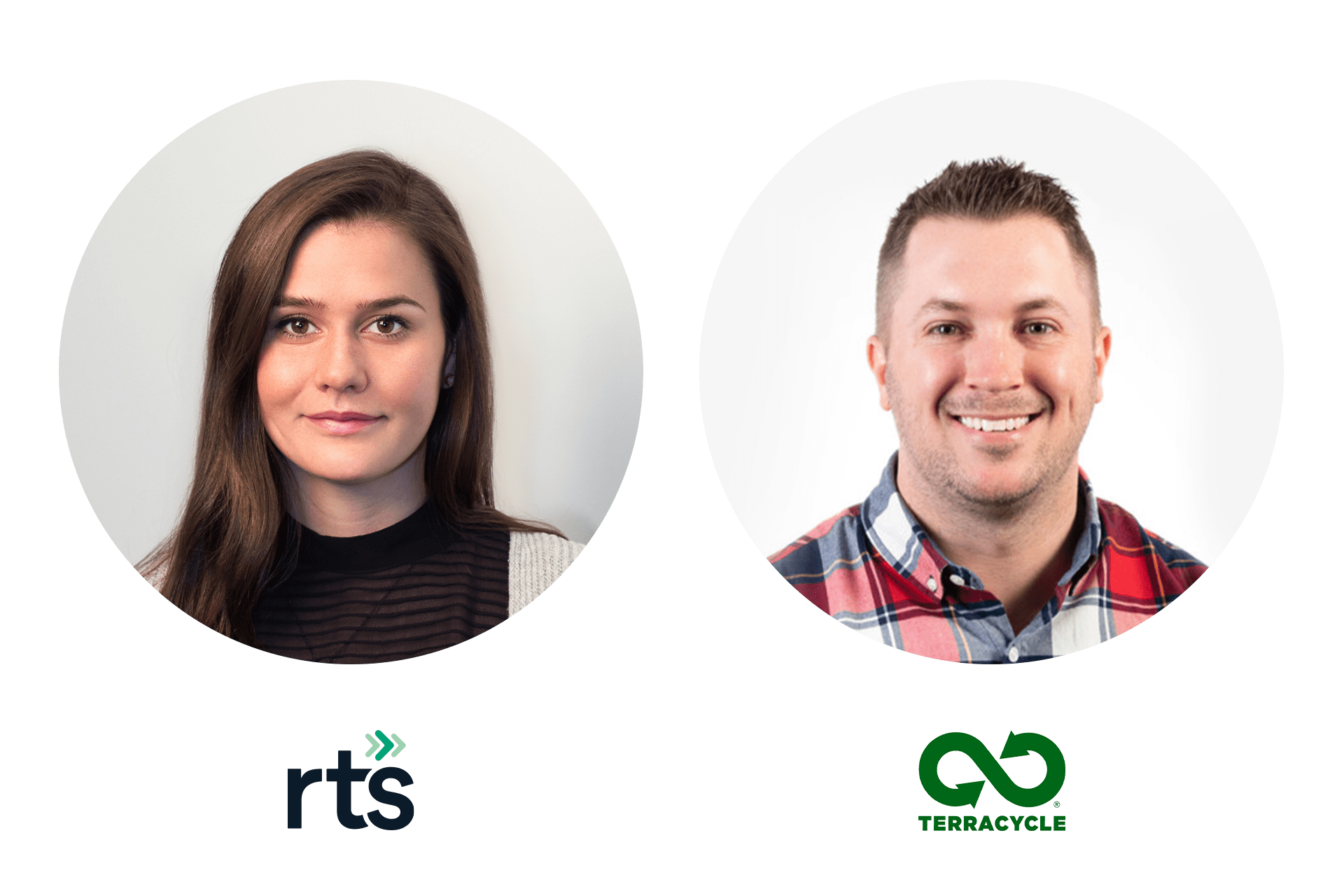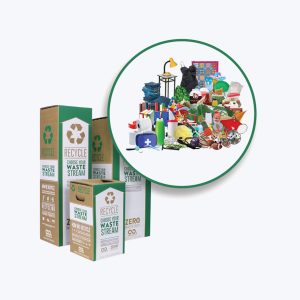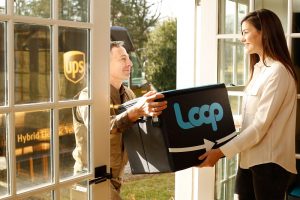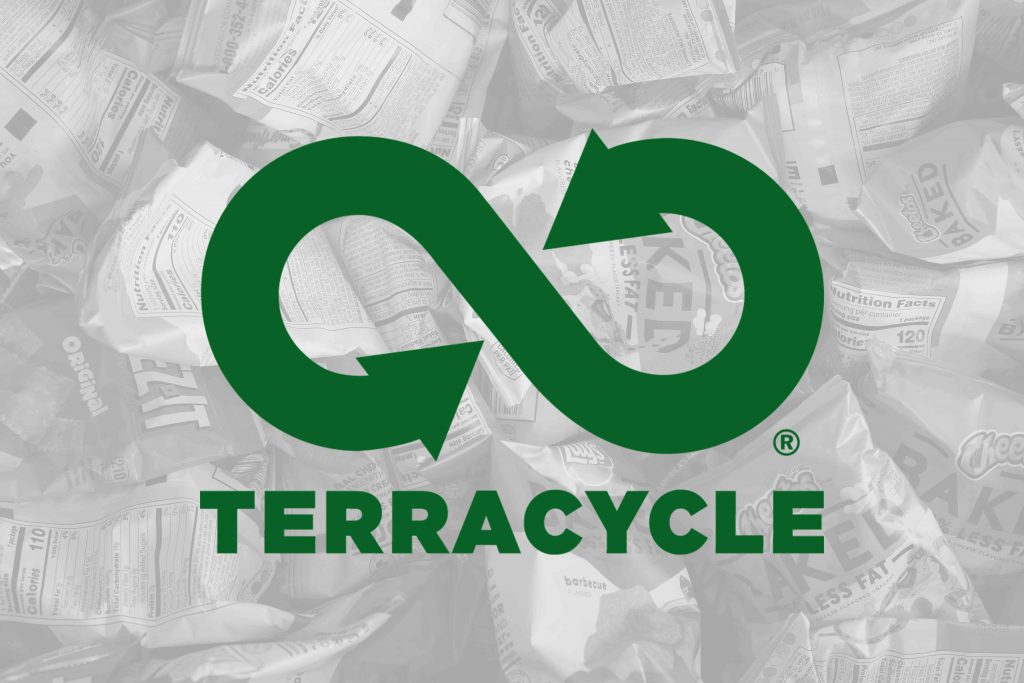As consumers in today’s world, we generate an enormous amount of waste, most likely without realizing it. Think about your day from start to finish. What are you buying, eating, drinking, and cleaning with?
How familiar is this scenario? You toss an empty tube of toothpaste after brushing your teeth. You make yourself a cup of coffee with a K-Cup. You’re given a plastic bag for your groceries. You get rid of that sponge that has scrubbed its last plate. You uncork that bottle of wine and throw away the cork.
Can you consider alternative reusable options to swap out with some of those disposable or single-use products? Can you include some of those materials within your curbside recycling program or another conveniently located recycling option? If the answer is ‘No’ to both, the next likely option you might choose is to throw those items away in the trash.
TerraCycle offers individual consumers and businesses another, not as well known option to divert waste from landfill or incineration.
TerraCycle is a social enterprise company on a mission to eliminate waste by finding ways to recycle traditionally “hard to recycle” materials. What do we mean by hard to recycle materials? These are materials that aren’t traditionally recyclable, or they are not a widely accepted material permitted in municipal or commercial recycling programs due to a lack of demand for that specific type of material. TerraCycle is actively working to fill some of the gaps in today’s recycling industry and allows businesses and individual consumers to recycle materials through voluntary programs.
RTS sat down with Brett Stevens, Global VP of Material Sales and Procurement at TerraCycle to learn more about TerraCycle’s history, recycling programs, and its mission to eliminate waste.

Q: Can you start by telling us about TerraCycle and the mission of the company?
A: TerraCycle is a global organization with a focus on collecting and recycling traditionally non-recyclable waste. These are things that you cannot put into your curbside recycling bin, and consumers have no other choice but to throw them in the trash, where they eventually end up in landfill. Many of these programs are funded by major consumer brands and/or retailers, with an eye toward making their products and packaging nationally recyclable. TerraCycle is a privately held company headquartered in New Jersey, and we have operations in 20 countries around the world. The mission of the company is to eliminate the idea of waste.
Q: Can you tell us more about the history of TerraCycle? What drove CEO, Tom Szaky, to start the company?
A: TerraCycle was founded in 2001 by Tom Szaky, our current CEO, when he was enrolled at Princeton University. The original basis of the company was to collect empty soda bottles and fill them with worm casings (i.e. worm poop) generated by having worms eat and digest cafeteria food waste. The product we made was a 100% natural fertilizer and plant food packaged in an empty soda bottle, with a new label slapped on it. The idea was ahead of its curve at the time because it was using bottles that may not have otherwise been recycled – and it completely eliminated the need for new, virgin plastic to make packaging. The product was carried by Walmart, Home Depot, and many others in the early days up until TerraCycle was sued by Scott’s, the leading fertilizer company in the category, for trade dress infringement. The companies settled out of court and TerraCycle pivoted its business model into eliminating the idea of waste entirely. We did this by focusing on collecting packaging waste that did not have any other end-of-life option besides being thrown in the garbage. The business model was to contact major consumer brands whose plastic packaging could not go into the curbside recycling bin, but who wanted to create a sustainable disposal method. Private recycling programs were born. Today, TerraCycle still uses this model and we are now partnered with hundreds of major consumer brands (many of them global brands) around the world to collect thousands of SKUs (stock keeping unit) of traditionally non-recyclable packaging.
Q: Can you walk us through the different programs TerraCycle offers and how they started?

Source: Shop TerraCycle Zero Waste Box
A: Many of TerraCycle’s programs are consumer-facing recycling programs where people can collect and send in specific types of waste. This is the main business unit within TerraCycle, called Brand Partnerships. The companies who fund our collection programs within this division make it possible for everyday people to send in their waste to be recycled for FREE. We also have a Zero-Waste Box program available for homeowners, small businesses, retailers, etc. This division allows us to sell a turn-key item (a box with a pre-paid return shipping label) where a specific type of waste can be sent back to be recycled. Zero-Waste Boxes cover thousands of different items that are normally not able to be recycled, and these boxes are for sale on the website covering almost every other waste stream that our free programs do not address. The Materials division of TerraCycle focuses on selling large-scale recycling programs from manufacturing facilities and distribution centers, and the group also sells recycled plastic pellets and regrind made from the items we’ve collected. LOOP is a separate company under the TerraCycle umbrella focused on working with brand partners to develop and sell products in a but durable/refillable packaging format, which is often much higher-end than the traditional packaging. Unlike normal packaging, this packaging would be owned by the Brand and would cycle back through the system to be sterilized and refilled before it gets redistributed to new consumers in the system.
Q: What happens to the materials that you collect through these programs?
A: Unless specifically noted, all materials are mechanically recycled through several different subcontractor locations that TerraCycle uses as partners. In every market where TerraCycle operates, the intention is to process as locally as possible to minimize carbon impact associated with transportation. Our role is to facilitate the recycling process by being the sole contact for the brands or companies that we work with and provide all relevant detail back to them via different types of reporting.
Q: LOOP is one of your more recent programs, what inspired you to start this program, and how is it helping to reduce waste?

Source: TerraCycle
A: LOOP was founded specifically to address the waste issues created by the world’s current take, make, dispose model which extracts natural resources from the environment, produces new virgin materials from them, and then uses those raw materials to create a single-use package. Far too much waste is generated because of consumers’ obsession with convenience, and the LOOP model is one where we try to address this through a durable, refillable packaging model. This is a brand-new company that has launched pilots in a few different markets around the world, and initial feedback has been strong.
Q: What advice or message do you for those who are trying to be more responsible consumers?
A: The biggest advice we can give is more for the companies who manufacture products that use outer packaging. It’s important that these companies talk to EVERY stakeholder involved in the value chain, not just the next player that they most often do business with. In the case of the value chain for recycling or end-of-life, we’re talking about all of the following stakeholders getting around the table to discuss how certain packaging decisions impact the other players: brand marketing team, brand sustainability team, brand procurement team, packaging suppliers/converters, retailers, MRF’s, reclaimers, private recycling companies, and end-users of recycled material. This will help to create a collaborative environment where decisions are not made in a vacuum, and it’ll ultimately create more opportunities for the material to be captured and recycled. From there, consumers can become better educated about what they can do with waste and the end-of-life so that they can take it or send it to the appropriate place.
For consumers, look out for brands whose packaging claims to be compostable or biodegradable because that material is likely only industrially compostable, and it can be hard for residents to have access to an industrial facility.
TerraCycle is doing a lot of great work offering real recycling solutions for conscious consumers looking to do the right thing.
We urge our readers to keep in mind that reducing waste is the best way to start making an environmental impact. We need to move away from our “throwaway society” behaviors in order to create a more sustainable world. Reduce your consumption first and foremost, choose reusables over disposables, and as a last resort, choose products made from materials that are recyclable in your community’s recycling program. Choose to be an informed consumer.
If you’re looking for sustainable products to replace your not-so sustainable products, check out ZeroWaste.com to find some Zero Waste products that work for you.
For more information on how RTS can help your business leverage education to become more sustainable, contact our team of TRUE Advisors today who will discuss your specific needs and how they can be addressed. Additionally, for more information on recycling, sustainability, Zero Waste, and the circular economy, explore our resources here.

